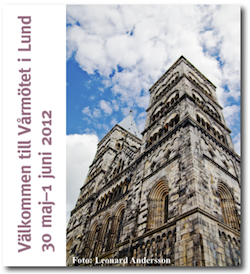Swedish Neurological Society – past, present and future challenges
by Martin Gunnarsson
During the 19th century, neuroscience was established as a very important research area in the Swedish scientific community (see article by professor Sten Fredrikson in the May issue of Neuropenews). Even today, the academic tradition has a strong influence on how the neurological patient care in Sweden is organized.
 The history of the Swedish Neurological Society dates back to 1938, when it was founded on the initiative of professor Nils Antoni from Karolinska Institutet in Stockholm. At that time, neurologists could exclusively be found in university hospital based clinics. In the following decades, however, neurology expanded and efforts were made to establish the discipline also in general hospitals of Sweden. In some places independent neurological departments were established, especially in hospitals reaching university status, but neurologists also started to serve at internal medicine units. Major disease entities affecting the nervous system, such as cerebrovascular disease, were traditionally handled by internists in many hospitals all over Sweden. Neurologists often had a consultative role, mainly for diagnostic purposes or follow-up in case of more rare neurological diseases. By the end of the 20th century, neurologists were consequently spread over larger geographical areas and serving under very different conditions. A major task for the Swedish Neurological Society was to gather these neurologists together.
The history of the Swedish Neurological Society dates back to 1938, when it was founded on the initiative of professor Nils Antoni from Karolinska Institutet in Stockholm. At that time, neurologists could exclusively be found in university hospital based clinics. In the following decades, however, neurology expanded and efforts were made to establish the discipline also in general hospitals of Sweden. In some places independent neurological departments were established, especially in hospitals reaching university status, but neurologists also started to serve at internal medicine units. Major disease entities affecting the nervous system, such as cerebrovascular disease, were traditionally handled by internists in many hospitals all over Sweden. Neurologists often had a consultative role, mainly for diagnostic purposes or follow-up in case of more rare neurological diseases. By the end of the 20th century, neurologists were consequently spread over larger geographical areas and serving under very different conditions. A major task for the Swedish Neurological Society was to gather these neurologists together.
In the beginning of the 21st century, the development of therapeutic interventions in neurology has led to a paradigm shift. Neuroradiology is increasingly accessible and enables early diagnosis of various neurological diseases. Acute conditions such as ischemic stroke and chronic diseases like multiple sclerosis can be successfully treated. This remarkable era has further emphasized the role of the Swedish Neurological Society to promote increased access to neurological expertise irrespective of residency in Sweden. Due to large geographical distances, there is certainly a need for more and larger neurology departments outside the university hospitals. Swedish Neurological Society advocates co-operation between such units and the university hospital clinics in order to maintain high quality education and research.
Today, the Swedish Neurological Society is an active association and consists of about 400 members. It is a non-profit organization and affiliated to Swedish Medical Association and the academic Swedish Society of Medicine. The international network is obtained by membership in European Federation of Neurological Societies (EFNS) and World Federation of Neurology (WFN).
Education is a high priority question on the daily agenda of the Swedish Neurological Society. This includes several aspects on training activities to become a neurologists and a national final board examination.
 A national meeting is held each spring in order to up-date knowledge and change experiences among neurologists.
A national meeting is held each spring in order to up-date knowledge and change experiences among neurologists.
It is a great honour for us to host the 16th EFNS congress and contribute to the tradition of international scientific and educational meetings in neurology. Swedish Neurological Society wishes you a warm welcome to Stockholm!
Dr. Martin Gunnarsson is the President of the Swedish Neurological Society and works at the Department of Neurology, University Hospital Örebro, Sweden



